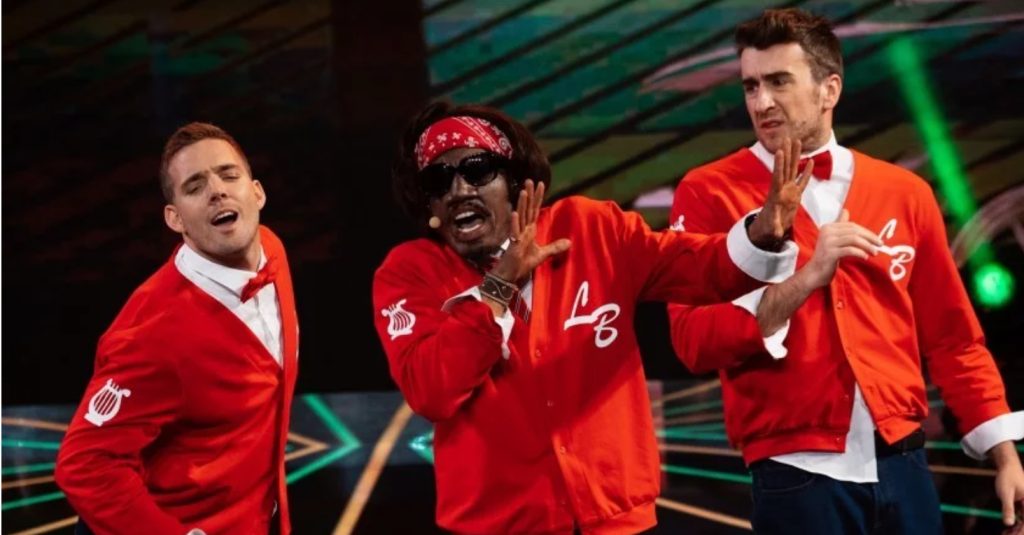September 29, 2020 – The Croatian version of hit TV show ‘Your Face Sounds Familiar’ returned to primetime this weekend and with it a continuing controversy. Why don’t many Croatians understand that blackface is racist?
Aired by Nova TV at 8.15pm on Sunday evenings, the Croatian version of ‘Your Face Sounds Familiar’ is popular family entertainment. In the show, celebrity contestants impersonate famous singers The first episode of this sixth series in Croatia saw two contestants imitate black American acts Ciara and Outkast. Both of the white performers who undertook these imitations did so using blackface.
Croatian celebrity Marko Braić as Outkast, performing their song ‘Roses’ in blackface.
This is not the first time blackface has been used on the show. Nor is it the first time that the use of blackface has caused a mixed response. Croatian media outlets Index and Vecernji List both published stories the following day, detailing the condemnation the show received from some viewers.
What’s more, Index included a reader poll in their story. On the issue of using blackface, of almost 18, 000 votes cast at the time of writing, 80% chose the option ‘I don’t see a problem, it’s just imitations. It’s acceptable.’ Only 9% of voters chose ‘That is racism – therefore offensive and unacceptable.’ 11% chose ‘I don’t think it’s racism, but it should be avoided.’
In the USA, UK, France, Germany and most other countries in what’s regarded as the ‘west’, blackface is now considered racist. The tradition of white performers adopting blackface stems back to mid 19th century when American actors would perform as blacks in minstrel shows. When doing so, they caricatured the mannerisms, character and features of blacks, often depicting them as lazy, ignorant, cowardly or hypersexual. The practice of blackface reinforced racial stereotypes. The minstrel shows aimed to amuse all-white audiences and to embody white people’s notions of superiority. The imitation taking place on the Croatian version of ‘Your Face Sounds Familiar’ is nothing like this monstrous past practice.
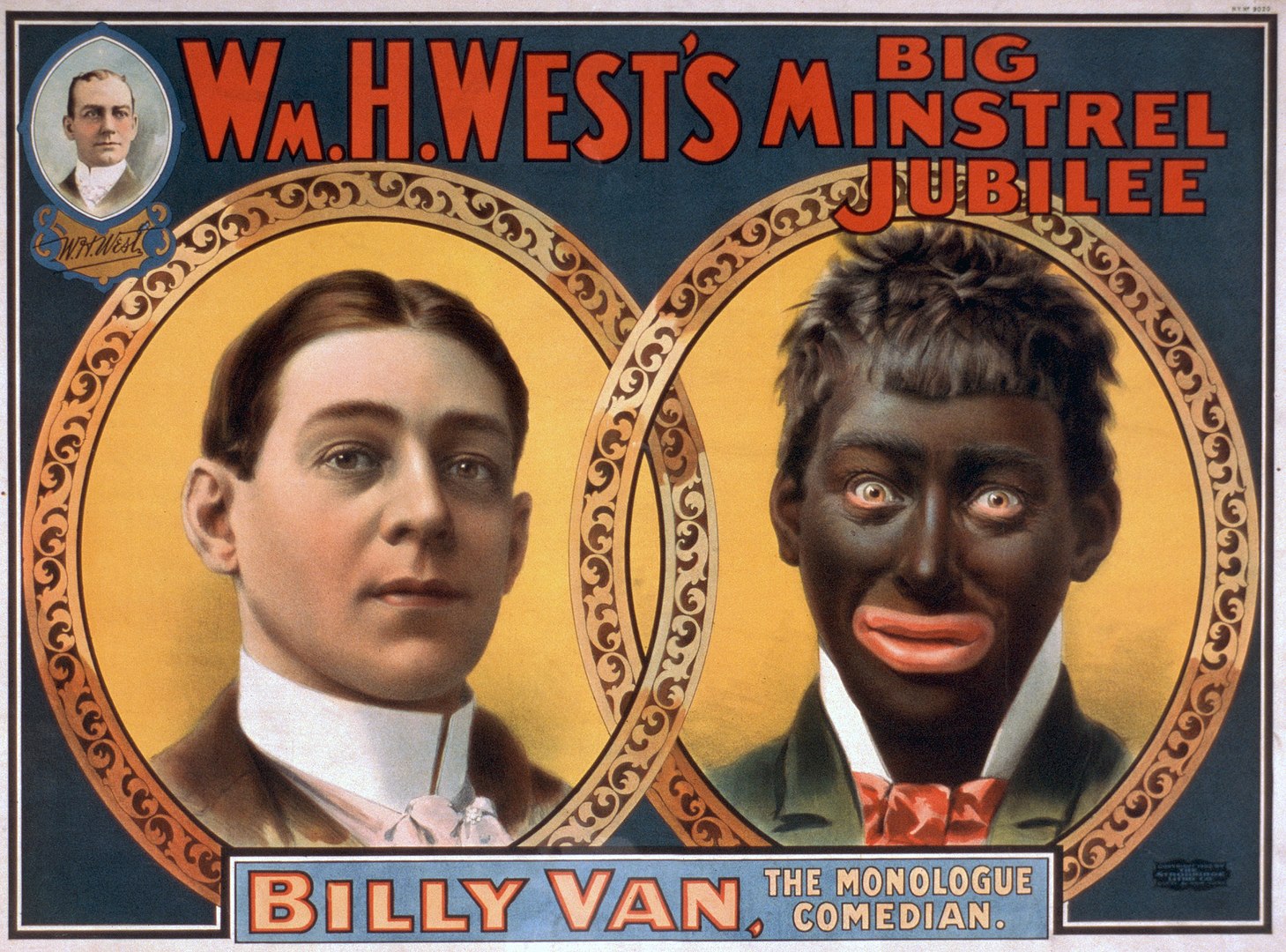 Reproduction of a 1900 William H. West minstrel show poster. In minstrel shows, blackface was racist – deliberately so © Strobridge & Co. Lith
Reproduction of a 1900 William H. West minstrel show poster. In minstrel shows, blackface was racist – deliberately so © Strobridge & Co. Lith
Needless to say, black Americans were always of the opinion that blackface is racist and were deeply offended. As the civil rights movement gained pace, this hurt finally began to be acknowledged. Introspection and education assisted in shifting perspectives so that now it is widely considered that blackface is racist. The regular appearance of blackface on TV in the UK ended in the 1970s, even earlier in the USA.
“By distorting the features and culture of African Americans – including their looks, language, dance, deportment and character – white Americans were able to codify whiteness across class and geopolitical lines as its antithesis,” says the Smithsonian’s National Museum of African American History and Culture today.
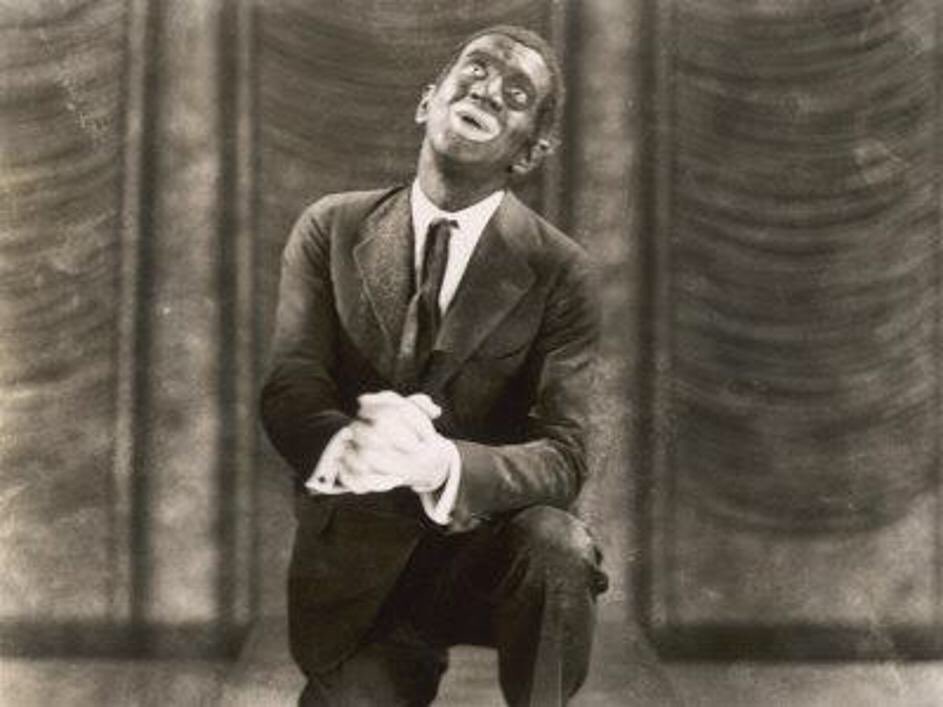
White performer Al Jolson famously used blackface in the 1927 film The Jazz Singer © Warner Brothers
If it is now widely accepted that blackface is racist and its undertaking all but outlawed, why is it still an acceptable part of primetime family viewing in Croatia? And why do so many Croatians not think that blackface is racist?
Well, it is almost beyond doubt that the celebrities taking part in the show choose to imitate these black singers because they like them and their songs. They are not mocking but paying tribute. Nova TV itself has a reputation for being among the more liberal and openminded broadcasters in the country. But, even if they are granted the benefit of the doubt and their intentions deemed as innocent, does that mean in this context it’s not true that blackface is racist?
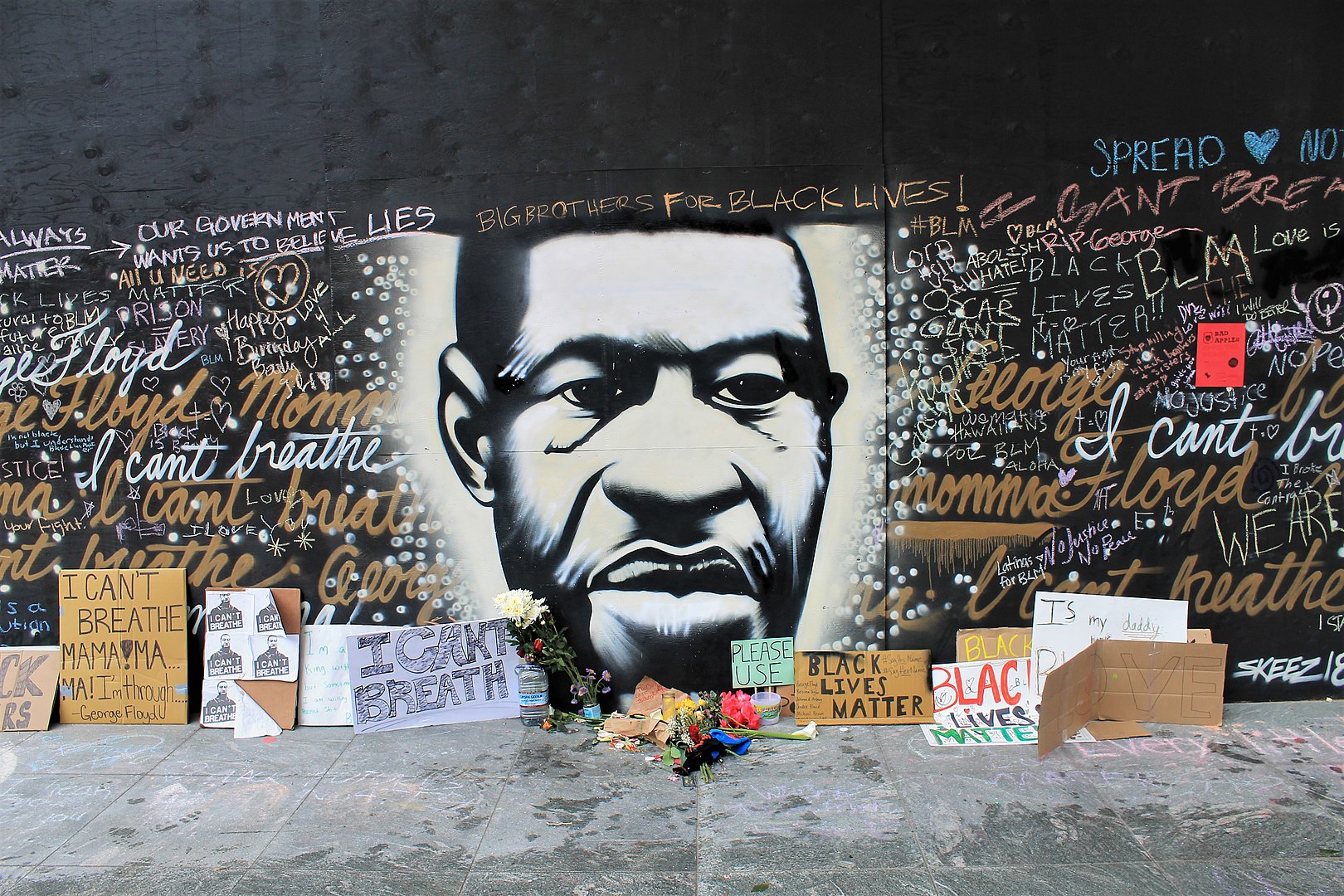 George Floyd mural created by protesters in Portland, Oregon. One result of the protests is that many broadcasters decided blackface is racist © Rickmouser45
George Floyd mural created by protesters in Portland, Oregon. One result of the protests is that many broadcasters decided blackface is racist © Rickmouser45
In 2001, old photos and a video of Canadian Prime Minister Justin Trudeau in blackface surfaced. “I regret it deeply. I’m deeply sorry I did that. I should have known better, but I didn’t,” he said after the revelations, apologising to his nation via collected journalists. “I didn’t consider it a racist action at the time, but now we know better. This is something unacceptable and it is racist. Darkening my face, no matter the context or circumstances is always unacceptable because of the racist history of blackface. I should have understood it then and I should never have done it.”
On 25 May 2020, American George Floyd was killed as he was being arrested. A white police officer named Derek Chauvin knelt on Floyd’s neck for a period initially reported to be 8 minutes and 46 seconds. Floyd’s death caused widespread protests that spread internationally.
One result of the protests in the UK was a re-examination of blackface’s use by non-racist comedians in popular comedy satire shows Little Britain, The Mighty Boosh and The League Of Gentlemen. The BBC, who commissioned all three series, removed all episodes which employed blackface, including some full series. The actors and creators of the shows apologised. Netflix removed two of the series from its platform altogether.
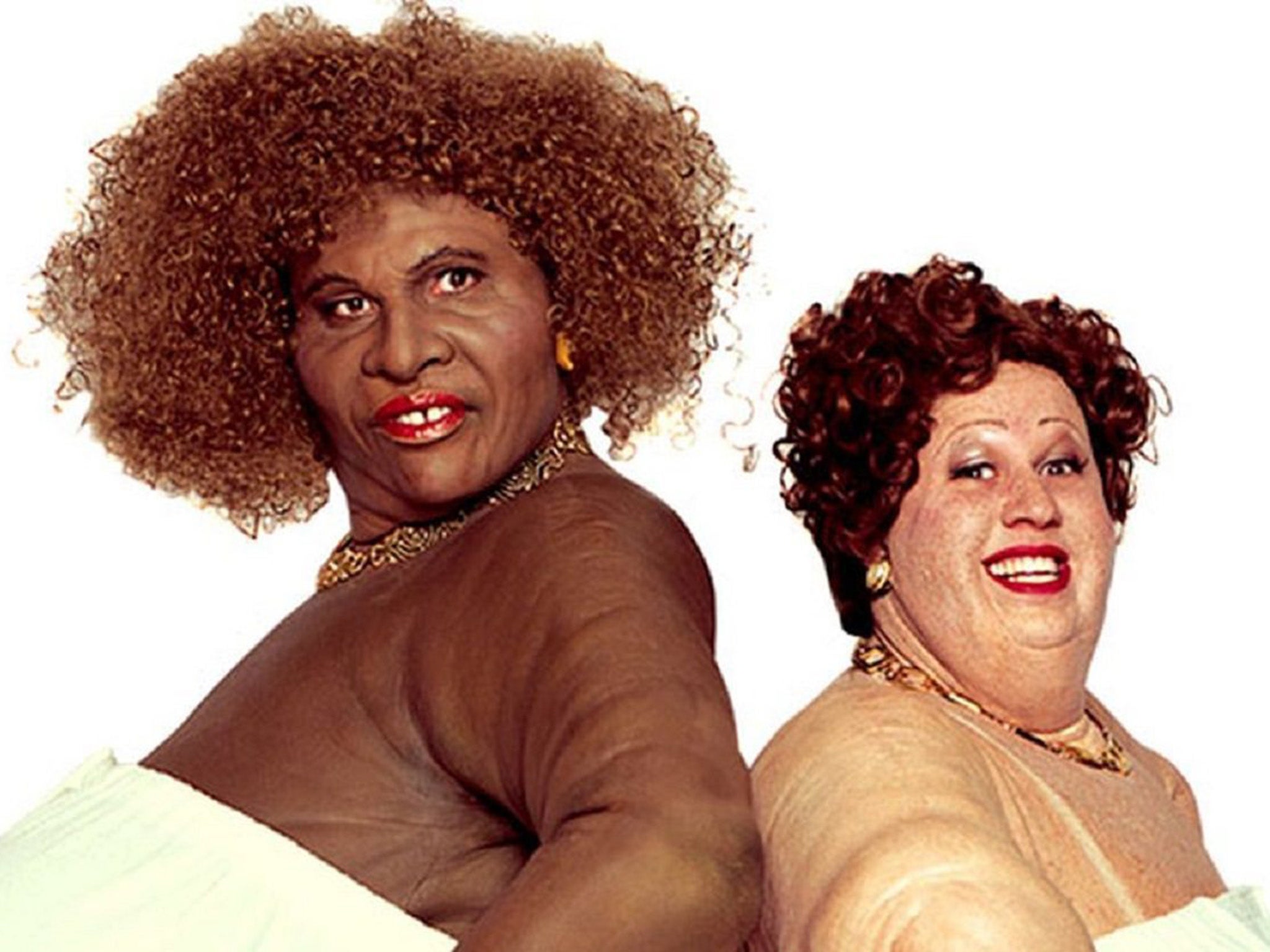 Matt Lucas and David Walliams in the comedy show Little Britain © BBC
Matt Lucas and David Walliams in the comedy show Little Britain © BBC
For some in Croatia, the insistence that blackface is racist comes across as liberal attitudes and political correctness taken to unacceptable extremes. This is probably quite a similar response to that of neanderthals when they were eventually told there are better ways of going about reproduction than forcibly dragging females back to their caves by their hair. And yet, doesn’t Croatia at least deserve to have this debate by itself?
Unlike the UK and the USA, Croatia has no track record of colonialism. Croatia has no economic superiority that was shamefully assisted by hundreds of years of slavery and imperialism. Croatia does not have a history of endemic racism directed towards its own black population. Blackface does not have the same hurtful history in Croatia that it does in the UK and the USA. There is no sizeable black population here that requires extra sensitivity because of previous and widespread ill-treatment. Unlike the USA and the UK, Croatia does not owe apologies for such.
In Croatia, racism may exist in some quarters, but there is nowhere on earth where it does not. And just because we see blackface on Nova TV, it would be wrong for people to automatically assume that programme makers, celebrity contestants and viewers are racist. Although, some will. One former winner of the show, Damir Kedzo has apologised for having used blackface in past editions.
Croatia does an amazing job of assimilating black people and others who come to live in the country. Unlike the UK and the USA where, over countless decades, large communities of non-whites have been ghettoised within their own communities, migrants to Croatia are placed within regular society. They live side by side with Croatians and accept the culture of the country that embraces them. And they are happy and grateful to be here. You would hear very few of them complain about the use of blackface on Croatian TV.
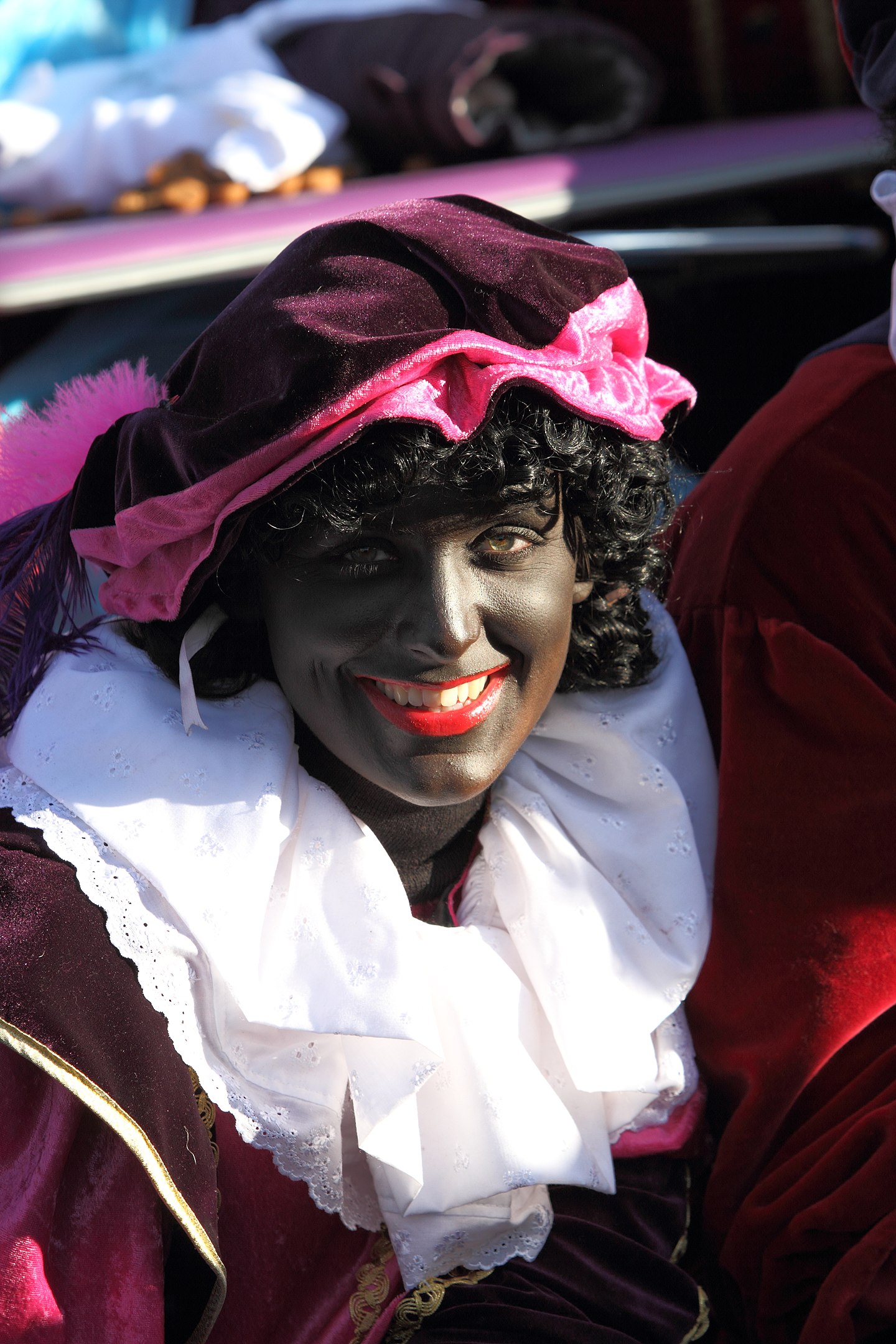 Someone dressed as Black Pete in the Netherlands. A debate about the character has been going on for years. For some, he is part of Christmas tradition. For others, blackface is racist © Sander van der Wel
Someone dressed as Black Pete in the Netherlands. A debate about the character has been going on for years. For some, he is part of Christmas tradition. For others, blackface is racist © Sander van der Wel
But, just because Croatia has a clean history in its treatment of black people, unlike the UK and the USA, and just because few black people live here, can Croats easily dismiss any opinion that blackface is racist? As stated, it is perhaps a debate that Croatians deserve to have among themselves. But, just like the debate surrounding St Nicolas’s controversial companion Zwarte Piet (Black Pete) in the Netherlands and Belgium, you cannot stop the rest of the world from watching as this debate takes place.
Is it important to Croatians that many outsiders will see them as racists because they enjoy a mode of performance now archaic elsewhere? Again, that is a question best answered by Croatians. By the same token, if Croatians are expected to understand how they might be viewed as racist for using blackface, it is only correct for former colonial (and now supposedly reformed) nations to try and understand why Croatia feels it is not.
It is too simplistic to say that many Croatians don’t get that blackface is racist because few black people live here. It is more true to say that Croatia has no history to be ashamed of in regard to its treatment of black people and therefore feels no shame in using blackface as a homage. The performances on Croatia’s ‘Your Face Sounds Familiar’ are clearly imitation. They are not the cruel caricature of minstrel shows. However, it also true to say that many Croatians don’t understand that blackface is racist and offensive simply because they are not themselves black.
The opinions expressed in this piece are solely those of the writer and not necessarily shared by Total Croatia News
For the latest travel info, bookmark our main travel info article, which is updated daily.
Read the Croatian Travel Update in your language – now available in 24 languages
Join the Total Croatia Travel INFO Viber community.

